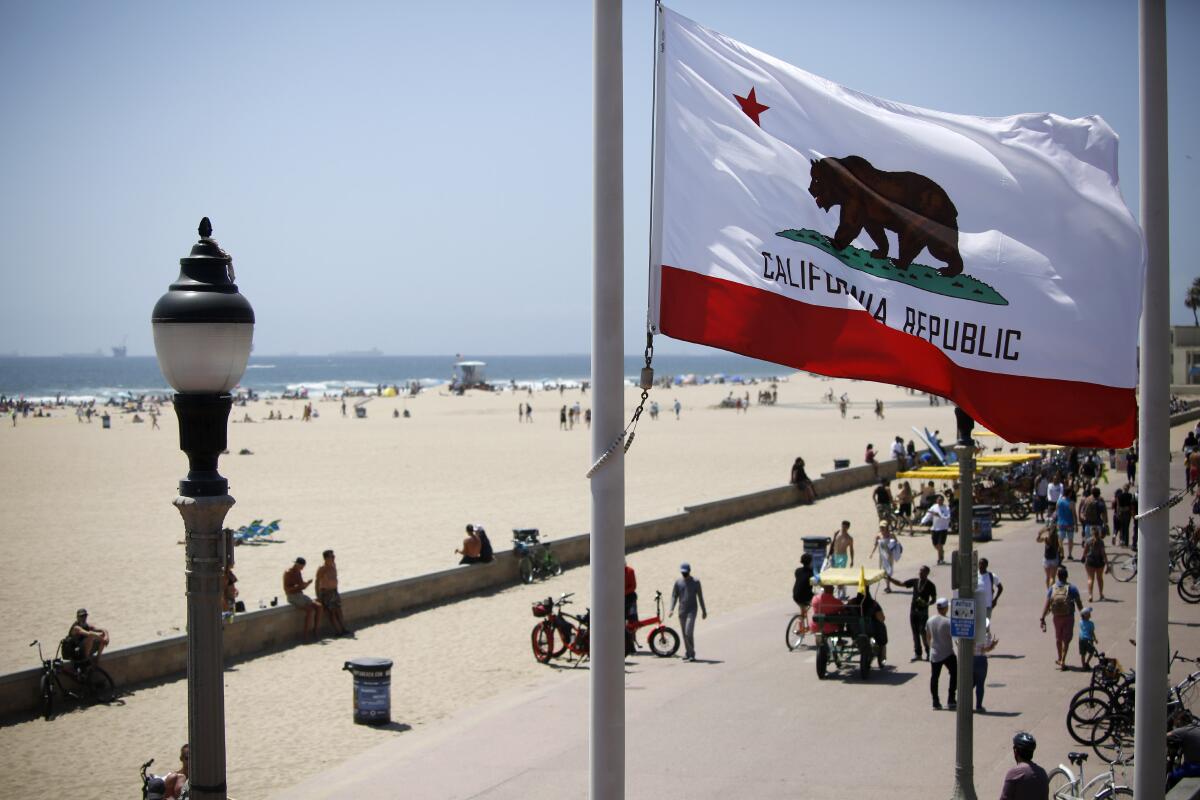Are Californians fleeing en masse to Texas? The reality is complicated

- Share via
On the busy, buzzing lanes of Interstate 10 in the westernmost reaches of Texas, sure enough there come cars headed east bearing plates with the red word across the top: California. But there are plenty of cars bearing black and white Texas plates bound the other way — for California.
For at least 15 years, it has become nearly cliché that Californians are moving to Texas, where jobs abound and the price of housing is far cheaper. But nearly unnoticed is the traffic that has long headed the other way from the Lone Star State to the Golden State, where between 35,000 and 40,000 Texans move annually regardless of economic conditions.
For the record:
1:54 p.m. Oct. 17, 2022An earlier version of this article incorrectly stated that Los Gatos is east of San Jose. It is west of that city.
Indeed, if Texas expats who arrived in California since 2000 had their own city it would be close to the size of San Jose — about a million people. But the Texodus to California bears a sharp distinction: While Californians headed east are drawn in by the promise of affordable suburban tract homes, many of the Texans bound in the other direction are recent college graduates seeking a fresh start to their young careers and lives. California continually attracts talents — and drains brains — from Texas.
Why I moved to Texas
Meet the faces of the California exodus to Texas
Ignore the Lone Star myth regularly promulgated by right-wing Republican Gov. Greg Abbott: There’s no evidence that Californians move to Texas because of its deep red politics. Some may appreciate those politics, some may loathe them. But political ideology is hardly a reason for people to make the financial investment in moving halfway across the country. People move for family and money — often for a higher-paying job or a lower cost-of-living.
The reality is that the big population states are typically the largest sources of new migrants for other big population states. It’s just math. South Dakota isn’t going to flood New York with new faces. California is still the most populous state, and Texas ranks second.
In that context, California’s migration to Texas — though larger overall than the traffic in the other direction — ebbs and flows. The number of Californians decamping to Texas jumped from just over 60,000 in 2017 to more than 85,000 in 2018, according to U.S. Census data analyzed by William Fulton at Rice University’s Kinder Institute. By contrast, the migration from Texas to California has been relatively steady over the past 15 years.
Thus the route between California and Texas is a story of exchange, not a one-way journey — and one shaped by income. Though (billionaire) Elon Musk and (millionaire) Joe Rogan earned headlines moving to Texas, Californians leaving the state tend to be working and middle class, looking for a cheaper place to live. Between 2010 and 2020, about 700,000 lower-income people left the Golden State, followed by more than 300,000 middle-income people, according to data from the Public Policy Institute of California. The Kinder analysis found that migration from California to Texas lags behind the former state’s trend in home prices by a year or two.
‘Don’t move to Texas’: Billboard warns L.A., San Francisco residents about moving to Lone Star State
The billboard, which shows no political affiliation or sponsor, references Uvalde, Texas, where a gunman killed 19 children and two adults at an elementary school in May.
Newcomers to California, on the other hand, tend to be more educated and make more money. “Those who move to California also tend to have higher education levels than those who move out — an especially important factor given the state’s strong need for college graduates,” Hans Johnson of the Public Policy Institute of California wrote.
A glance at software engineering salaries says it all. A freshly minted college graduate in computer engineering from the University of Texas at Austin might make, on average, $500,000 working in Los Gatos, west of San Jose. Austin, meanwhile, doesn’t even make a list from this year of the 25 top-paying markets for software developers (markets in which average salaries start at just over $200,000). Data provided by Allied Van Lines hint at those economic incentives for the wealthy, showing residents of upscale Texas ZIP codes in Katy, The Woodlands, Austin and Dallas moving to even more upscale California ZIP codes including those in Los Angeles, Newport Beach, San Jose and San Francisco.
The Dallas Morning News reported this year that “a whole lot of high income earners” were flocking to Texas. But that was defined as households making $200,000 — when the average household income for the top 5% of California’s earners is reported to be $531,000, compared with a $408,000 average for Texas’ top 5%.
Personally, I’ve seen plenty of Texans decamping for California: high school graduates headed to college in Southern California who basically never come back. College graduates from Texas who, after a lifetime here, are ready for something new. The list of famous ex-Texan Californians is long: Howard Hughes, Carol Burnett, Farrah Fawcett, Steve Martin, Shaquille O’Neal — though he did move back to the state, to Dallas.
All of this does indicate something important. Yes, California’s population is declining, losing about 1.7 million residents since 2010. The Golden State’s pricey housing market too often pushes out low- and middle-income people. At the same time, for a decade and a half, Texas has been losing many of its youngest, best-educated — and richest — to California.
Richard Parker is the author of “Lone Star Nation” and the forthcoming book “The Crossing.”
More to Read
A cure for the common opinion
Get thought-provoking perspectives with our weekly newsletter.
You may occasionally receive promotional content from the Los Angeles Times.








